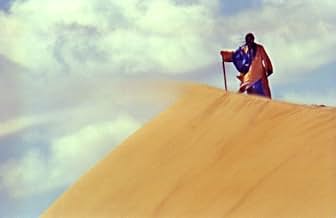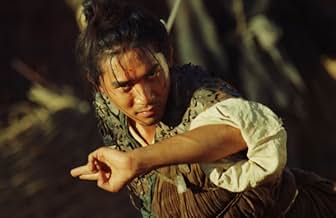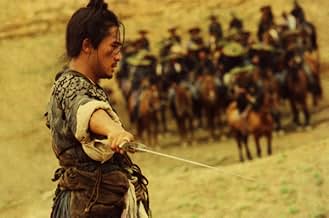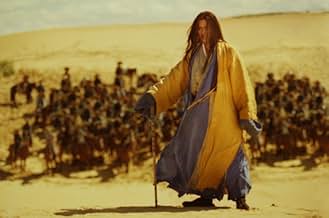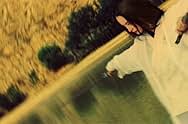VALUTAZIONE IMDb
7,0/10
17.764
LA TUA VALUTAZIONE
Un sicario con il cuore spezzato si trasferisce nel deserto dove trova abili spadaccini per eseguire i suoi omicidi concordati per contratto.Un sicario con il cuore spezzato si trasferisce nel deserto dove trova abili spadaccini per eseguire i suoi omicidi concordati per contratto.Un sicario con il cuore spezzato si trasferisce nel deserto dove trova abili spadaccini per eseguire i suoi omicidi concordati per contratto.
- Premi
- 9 vittorie e 13 candidature totali
Tony Leung Chiu-wai
- Blind Swordsman
- (as Tony Chiu Wai Leung)
Collin Chou
- Swordsman
- (non citato nei titoli originali)
Shun Lau
- Leader of Ouyang's Opponents in Opening Battle
- (non citato nei titoli originali)
Li Yin
- Rebel swordsman
- (non citato nei titoli originali)
Recensioni in evidenza
Although I enjoy them, I seldom re-watch slow and introspective movies. Ashes of Time is the exception to the rule, as it haunts me so much that I have already given it three viewings! It may be because of the wonderful pictures, the essential yet poignant dialogues or the grave & epic music, nevertheless Ashes of Time is a fascinating movie!
Set in a tavern in the middle of the desert, it tells us stories of different swordsmen and deals with the theme of unrequited love. All the people, in fact, had to face a rejection.. and now strive to find a way to overcome the delusion and go on with their life. Swordsmanship is mostly viewed as an outlet to bring out the inner passions and frustrations.
The protagonist, Ouyang Feng [Leslie Cheung] is one of those swordsmen, who left his lady [Maggie Cheung] and his village to pursue fame and glory, convinced that she would have waited for him to return. Now instead he faces loneliness and the fact that she has married his elder brother.
The most peculiar aspect of the movie is the pictures, so beautifully shot that each still can make a wonderful portrait. Even the battles, rather than being filmed continuously, are rendered as a sequence of separate shots, thus remaining more indelibly impressed in our head. Indeed, the movie also focuses about memory (whom the movie title probably refers to) and its power to keep alive moments of the past, that otherwise would perish in the flow of time. Highly recommended! 9/10
Set in a tavern in the middle of the desert, it tells us stories of different swordsmen and deals with the theme of unrequited love. All the people, in fact, had to face a rejection.. and now strive to find a way to overcome the delusion and go on with their life. Swordsmanship is mostly viewed as an outlet to bring out the inner passions and frustrations.
The protagonist, Ouyang Feng [Leslie Cheung] is one of those swordsmen, who left his lady [Maggie Cheung] and his village to pursue fame and glory, convinced that she would have waited for him to return. Now instead he faces loneliness and the fact that she has married his elder brother.
The most peculiar aspect of the movie is the pictures, so beautifully shot that each still can make a wonderful portrait. Even the battles, rather than being filmed continuously, are rendered as a sequence of separate shots, thus remaining more indelibly impressed in our head. Indeed, the movie also focuses about memory (whom the movie title probably refers to) and its power to keep alive moments of the past, that otherwise would perish in the flow of time. Highly recommended! 9/10
I have my message headed with a WARNING because I don't want any readers to be misled and go rushing for this movie thinking it's like anyone of those Chinese Wuxia movies. This is not an action based movie, it only has "sword fighting" world as a background. This is what always made WKW's films different from any others'. This film has probably the least action scenes compared to any other sword fighting films made within the last 15 years.
I called it Timeless because seen again today, you don't find it outdated like some others' films. This is among the only 4 Chinese films that I will enjoy watching again every 2 or 3 years and I think this is the most "timeless" among the 4.(The other 3 are Love Eterne(Li Han Hsiang), A Touch of Zen(King Hu) and Days of Being Wild(WKW))
This is the kind of film that you know it's great even if you don't understand it. You don't need to understand its story in order to enjoy it. It's message is simply about "memories" and "regrets". It said something like "Regrets is the most painful feeling" and "regrets and unhappiness because of memories".It's the most complicated among WKW's 7 or 8 films(till 2046 and Eros). I don't fully understand it during the first viewing but I was totally surprised and mesmerized. I am the type that will consider a film good only if after watching, surprised me and felt that i could not thought of such a film. If I can expect or imagine a film's outcome, I will not call it great. Even after 4 viewings now, I am not totally sure I have figured out all its sequences yet but it doesn't matter. Some of the scenes and editions are paced so fast that you may not recall seeing it. Just like his recent 2046. This is the work of a brilliant director,because you need more than 1 viewing to fully get it so you must buy a copy for future viewing. Heard that even the Venice Filmfest Jury has to give it a prize although they don't understand what's it about.
Those who don't know how to appreciate a good film may not understand a WKW film as he seldom stick to a particular genre, his films' genre is simply WKW and it's all about sights and sound in WKW-style. Original, stylish and trend setting. After his Ashes of Time and Fallen Angels swept all the major awards during the HK Film Awards in the same year, 2 most prominent HK directors changed style and tried to follow WKW-style but both failed(Tsui Hark in Dao(Blade) and Stanley Kwan in Hold Me Tight.
WKW has mentioned that movies, to him is most is sights and sound and we see it clearly in this film. The music and the cinematography is the best.
Those who don't like WKW films may criticize that he don't has a script or don't know what he wants until the final edition. I totally disagree. I think WKW always know what he wants and completed the film just the way he wants it, otherwise how could all his films are being so well received by critics ?. As for the viewers, what we want is the finished work. We don't care the original idea or the casts. We only care for the outcome. I mentioned it because this film took 2 years to complete and along the way, plot and actors have changed.
Leslie Cheung - nominated for best acting here but I find him better in 2 other WKW films, Days of Being Wild and Happy Together(WKW won best director at Cannes). Brigitte Lin is superb in a dual character role/s. Tony Leung and Carina Lau are always good(usually and only) in WKW films. Maggie Cheung(unbilled) has her best 2 single take shots(her fans must keep this.) Even pop idol Michelle Yeung who never act well appeared like she acted.
I strongly recommend this film to any film student or critics. Those who like "2046" or Tsui Hark's The Blade will like it. This is not WKW's best but I consider it his most UNIQUE. Like any other WKW movies, it's a collectors' item and a future classic, if not already one.
I called it Timeless because seen again today, you don't find it outdated like some others' films. This is among the only 4 Chinese films that I will enjoy watching again every 2 or 3 years and I think this is the most "timeless" among the 4.(The other 3 are Love Eterne(Li Han Hsiang), A Touch of Zen(King Hu) and Days of Being Wild(WKW))
This is the kind of film that you know it's great even if you don't understand it. You don't need to understand its story in order to enjoy it. It's message is simply about "memories" and "regrets". It said something like "Regrets is the most painful feeling" and "regrets and unhappiness because of memories".It's the most complicated among WKW's 7 or 8 films(till 2046 and Eros). I don't fully understand it during the first viewing but I was totally surprised and mesmerized. I am the type that will consider a film good only if after watching, surprised me and felt that i could not thought of such a film. If I can expect or imagine a film's outcome, I will not call it great. Even after 4 viewings now, I am not totally sure I have figured out all its sequences yet but it doesn't matter. Some of the scenes and editions are paced so fast that you may not recall seeing it. Just like his recent 2046. This is the work of a brilliant director,because you need more than 1 viewing to fully get it so you must buy a copy for future viewing. Heard that even the Venice Filmfest Jury has to give it a prize although they don't understand what's it about.
Those who don't know how to appreciate a good film may not understand a WKW film as he seldom stick to a particular genre, his films' genre is simply WKW and it's all about sights and sound in WKW-style. Original, stylish and trend setting. After his Ashes of Time and Fallen Angels swept all the major awards during the HK Film Awards in the same year, 2 most prominent HK directors changed style and tried to follow WKW-style but both failed(Tsui Hark in Dao(Blade) and Stanley Kwan in Hold Me Tight.
WKW has mentioned that movies, to him is most is sights and sound and we see it clearly in this film. The music and the cinematography is the best.
Those who don't like WKW films may criticize that he don't has a script or don't know what he wants until the final edition. I totally disagree. I think WKW always know what he wants and completed the film just the way he wants it, otherwise how could all his films are being so well received by critics ?. As for the viewers, what we want is the finished work. We don't care the original idea or the casts. We only care for the outcome. I mentioned it because this film took 2 years to complete and along the way, plot and actors have changed.
Leslie Cheung - nominated for best acting here but I find him better in 2 other WKW films, Days of Being Wild and Happy Together(WKW won best director at Cannes). Brigitte Lin is superb in a dual character role/s. Tony Leung and Carina Lau are always good(usually and only) in WKW films. Maggie Cheung(unbilled) has her best 2 single take shots(her fans must keep this.) Even pop idol Michelle Yeung who never act well appeared like she acted.
I strongly recommend this film to any film student or critics. Those who like "2046" or Tsui Hark's The Blade will like it. This is not WKW's best but I consider it his most UNIQUE. Like any other WKW movies, it's a collectors' item and a future classic, if not already one.
'Dung Che Sai Duk' (aka 'Ashes of Time') is a beautiful visual tapestry. It is another fine example of poetry on canvas. The story does not follow a linear structure but at the same time the dazzling visuals grip the viewer and involve us in the characters' life. The first time I watched 'Dung Che Sai Duk' I was engaged throughout the entire duration but by the end I was left a little confused. This is because I overlooked the layers and some of the important details. It also didn't help that the subtitles were poor. After second viewing, this time with better subtitles, it became a lot more clearer and my appreciation has increased much more.
Almost the entire film is set in the desert. There are plenty of swordfights to enjoy but this is secondary to the story which is mainly about unrequited love and how the fights are a projection of their anger and way of dealing with rejection. The fight scenes are well choreographed. However, I felt slow motion was overused. The editing is good but I was disappointed that so many sequences were cut from the Redux version. The dialogues are marvelously poetic. The tricky cinematography is conducted through various angles and so astonishingly effective. The soundtrack is superb and atmospheric. The cast boasts of top talented names like, Leslie Cheung, Maggie Cheung, Brigitte Lin, Tony Leung Chiu Wai, Jacky Cheung and Carina Lau all of whom do full justice to their roles with subtle performances.
Kar Wai Wong is known for experimenting with different themes and here he does that with unrequited love. Although the treatment of the story is slightly different when compared to his other works, the same essence remains within the characters. It is a movie that stays with you and invites you to revisit.
Almost the entire film is set in the desert. There are plenty of swordfights to enjoy but this is secondary to the story which is mainly about unrequited love and how the fights are a projection of their anger and way of dealing with rejection. The fight scenes are well choreographed. However, I felt slow motion was overused. The editing is good but I was disappointed that so many sequences were cut from the Redux version. The dialogues are marvelously poetic. The tricky cinematography is conducted through various angles and so astonishingly effective. The soundtrack is superb and atmospheric. The cast boasts of top talented names like, Leslie Cheung, Maggie Cheung, Brigitte Lin, Tony Leung Chiu Wai, Jacky Cheung and Carina Lau all of whom do full justice to their roles with subtle performances.
Kar Wai Wong is known for experimenting with different themes and here he does that with unrequited love. Although the treatment of the story is slightly different when compared to his other works, the same essence remains within the characters. It is a movie that stays with you and invites you to revisit.
I had the same issues with Wang Kar Wai's other movie "2046". Whats this all about? Mortality, love, existence. It's somehow about all of this. In other movies these themes are dealt with in the background of a plausible or implausible story. Here they are dealt with head-on, in what feels like a long hypnotic "dream poem" that is more symbol than story. There is the deep Camus-like narrator voice in the background saying stuff like "She waited frozen under deep unrelenting waves and the smell of eucalyptus" (not a line from the movie, but it could be). Maybe there is a lot that isn't easily translated. So it's confusing both intentionally and unintentionally. At the same time there is some kind of majestic beauty to it. It is mostly quiet and moody but erupts occasionally with little bouts of violence. To be honest I hardly understood any of this movie (full credit to whoever wrote the IMDb synopsis) but I was left with an impression - a feeling, a mood, an emotional state - which may have been the whole point.
Kar-Wai is one of the three best directors working today. Many feel this is his best work. Surely it is the greatest leap since his previous, but I find the Mood-2046 pair more important, even lifealtering.
If you come into this expecting a story that unfolds in good order and makes sense, you will be disappointed. The overlapping of layers, the folding of narrative, the merging of images is what we're in for.
There are two famous stories about this. The first is that at some point he quit work, then quickly went off to make "Chunking Express," during which he "found himself" ...
The other story has to do with "Pulp Fiction." Tarantino is a huge borrower of ideas. Having already written a couple "raw" movies that people admire, he stumbled upon Kar-Wai in the midst of making this a long affair. All the clever bits in the structure of "Pulp" are from this, just as surely as all the clever bits in "Star Wars" are from Kurosawa.
What are those bits? Multiple persons in one body. Multiple bodies for one person. Circular storytelling where any part is the beginning. Nested narrative where one story tells another. Characters that imagine and forget each other, bringing them into our world and out.
Death, love, yearning, accident, encounter.
All of this at the beginning of a luscious partnership between Kar-Wai and Christopher Doyle. They are today what Greenaway and Sacha Vierny were: dangerous adventures in cinematic imagination coupled with mastery of cinematic expression.
This takes a few too many chances and you can see precisely where Kar-Wai abandoned it to search for sense. (He always shoots in order of what you see.) But if you are ready for the transcendental thrills of his later work, you might want to start here.
Ted's Evaluation -- 3 of 3: Worth watching.
If you come into this expecting a story that unfolds in good order and makes sense, you will be disappointed. The overlapping of layers, the folding of narrative, the merging of images is what we're in for.
There are two famous stories about this. The first is that at some point he quit work, then quickly went off to make "Chunking Express," during which he "found himself" ...
The other story has to do with "Pulp Fiction." Tarantino is a huge borrower of ideas. Having already written a couple "raw" movies that people admire, he stumbled upon Kar-Wai in the midst of making this a long affair. All the clever bits in the structure of "Pulp" are from this, just as surely as all the clever bits in "Star Wars" are from Kurosawa.
What are those bits? Multiple persons in one body. Multiple bodies for one person. Circular storytelling where any part is the beginning. Nested narrative where one story tells another. Characters that imagine and forget each other, bringing them into our world and out.
Death, love, yearning, accident, encounter.
All of this at the beginning of a luscious partnership between Kar-Wai and Christopher Doyle. They are today what Greenaway and Sacha Vierny were: dangerous adventures in cinematic imagination coupled with mastery of cinematic expression.
This takes a few too many chances and you can see precisely where Kar-Wai abandoned it to search for sense. (He always shoots in order of what you see.) But if you are ready for the transcendental thrills of his later work, you might want to start here.
Ted's Evaluation -- 3 of 3: Worth watching.
Lo sapevi?
- QuizThis film had an exhausting effect on Wong Kar-Wai. While on hiatus during the editing process he wrote and shot Hong Kong Express (1994) to "clear his head".
- Citazioni
Ou-yang Feng: People say, when you can't have what you want, the best you can do is not to forget.
- Versioni alternativeWong Kar-wai revisited the film and created the Redux version which premiered at the Cannes Film Festival 2008. This version has alternative footage and changes in the order of scenes. The Redux version has new opening titles, and the season's fade-ins introducing each chapter are new. It also has a new color-scheme and a new soundtrack. Some scenes from the original version have been deleted, for example the two main character's introduction in the beginning. The overall run time of the Redux version is slightly shorter than the original theatrical version.
- ConnessioniFeatured in Century of Cinema: Naamsaang-neuiseung (1996)
I più visti
Accedi per valutare e creare un elenco di titoli salvati per ottenere consigli personalizzati
Dettagli
- Data di uscita
- Paesi di origine
- Siti ufficiali
- Lingue
- Celebre anche come
- Ashes of Time: Redux
- Luoghi delle riprese
- Aziende produttrici
- Vedi altri crediti dell’azienda su IMDbPro
Botteghino
- Budget
- 40.000.000 HKD (previsto)
- Lordo Stati Uniti e Canada
- 174.273 USD
- Fine settimana di apertura Stati Uniti e Canada
- 21.372 USD
- 12 ott 2008
- Lordo in tutto il mondo
- 2.009.694 USD
Contribuisci a questa pagina
Suggerisci una modifica o aggiungi i contenuti mancanti

Divario superiore
By what name was Ashes of Time (1994) officially released in India in English?
Rispondi






